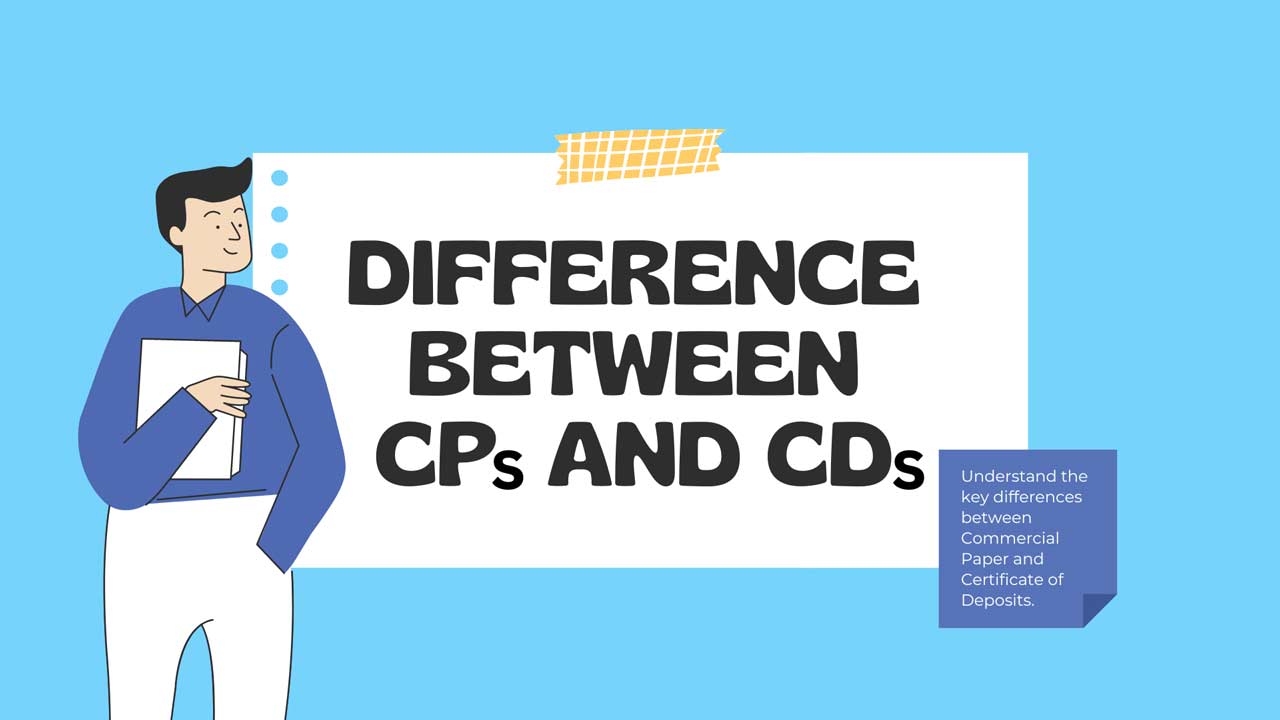Are you looking for safe and lucrative ways to invest your money? If so, you might have heard about commercial paper and certificates of deposit (CDs) as popular options. But what exactly are these financial instruments, and how do they differ?
Understanding the difference between commercial paper and Certificate of Deposits is crucial for investors who want to make informed decisions and maximize their returns. Whether you’re a seasoned investor or a beginner, read on to discover the ins and outs of these two investment vehicles and take your financial portfolio to the next level!
In this blog post, we’ll explore the unique features, benefits, and drawbacks of commercial paper and CDs, so you can choose the best investment strategy that fits your needs and goals.
What is Commercial Paper?
Commercial paper is an unsecured short-term debt instrument corporations issue to raise funds. It is a promissory note that promises the holder a fixed return at maturity. Commercial paper typically has a maturity period of less than a year, usually from one to 270 days.
It is generally sold at a discount to face value, which means that investors can earn a return by buying the commercial paper at a discount and holding it until maturity.
One of the main characteristics of commercial paper is that large, creditworthy corporations typically issue it with a high credit rating. These companies use commercial paper to meet their short-term financing needs, such as financing inventory, payroll, or accounts payable.
As a result, commercial paper is generally considered a safe investment, as it carries a lower risk of default than other types of debt instruments.
Also read: What is CMP in share market?
Investing in commercial paper has several advantages, such as providing a higher return than short-term investments such as bank deposits or treasury bills. Commercial paper is also highly liquid and can be quickly sold before maturity. Investing in commercial paper also allows investors to diversify their portfolios and reduce risk.
However, investing in the commercial paper also has its risks and drawbacks. For example, the government does not insure commercial paper, which means that investors risk losing their investment if the issuer defaults.
Additionally, commercial paper is subject to interest rate risk, which means that its value may fluctuate with changes in interest rates. Finally, investing in the commercial paper requires a minimum investment amount and is typically only available to institutional investors or high-net-worth individuals.
What are Certificates of Deposit?
Certificates of Deposit (CDs) are a popular investment option in India that offers investors a low-risk, fixed-income investment. CDs are time deposits that banks and financial institutions issue. They are similar to fixed deposits but with a higher interest rate and a fixed term.
One of the critical characteristics of CDs in India is their fixed term, which can range from 7 days to up to one year for commercial banks and 1 year to 3 years for financial institutions. The interest rate offered on CDs is typically higher than traditional savings accounts, making it a lucrative investment option for those looking to earn higher returns.
Investing in CDs in India has several advantages, such as being insured by the Deposit Insurance and Credit Guarantee Corporation (DICGC), which means the investment is safe. CDs are also highly liquid and can be quickly sold before maturity. Additionally, investing in CDs allows investors to diversify their portfolios and reduce risk.
However, investing in CDs in India also has its risks and drawbacks. For example, the interest earned on CDs is subject to tax, which can reduce the overall return on investment.
Additionally, CDs are subject to interest rate risk, meaning their value may fluctuate with changes in interest rates. Finally, CDs require a minimum investment amount and are typically only available to institutional investors or high-net-worth individuals.

Differences Between Commercial Paper and Certificates of Deposit:
When considering investment options, individuals often compare different financial instruments to determine the best fit for their needs. Commercial Paper (CP) and Certificates of Deposit (CDs) are two popular investment options. While they share some similarities, there are also several key differences between them.
| Basis | Commercial Paper | Certificate Of Deposits |
| Issued by | Corporations and financial institutions | Banks |
| Risk | Unsecured and carries higher risk | Insured by DICGC |
| Return | Potentially higher return | Typically lower return |
| Liquidity | Usually held until maturity, cannot be traded in secondary market | Can be traded in secondary market, but may require payment of penalty fee for early withdrawal |
| Investment Amount | Typically higher minimum investment requirement | Typically lower minimum investment requirement |
| Maturity Date | Short-term (From 1 to 270 days) | Short-term (But minimum 7 days) |
1. Primary Difference:
The primary difference between CP and CDs is the issuer. Corporations typically issue CP, while banks and financial institutions issue CDs. Additionally, CP is considered a short-term investment option, while CDs can have longer maturities.
2. Differences in risk:
CP is considered a higher-risk investment option as the DICGC does not insure it. CDs, conversely, are considered a low-risk investment option due to DICGC insurance.
3. Differences in return:
CP typically offers a higher rate of return than CDs due to the higher risk associated with the investment.
4. Differences in liquidity:
CP is generally more liquid than CDs, as it can be bought and sold on the open market. On the other hand, CDs are typically held until maturity and may incur penalties for early withdrawal.
5. Differences in investment amounts:
CP typically requires a higher minimum investment amount than CDs, which may make it less accessible to some investors.
6. Differences in maturity dates:
CP typically has a shorter maturity date than CDs, ranging from one to 270 days. CDs, conversely, can have longer maturity dates ranging from 7 days to up to one year for commercial banks and 1 year to up to 3 years for financial institutions.

Choosing Between Commercial Paper and Certificates of Deposit:
When deciding between Commercial Paper and Certificates of Deposit, there are several factors that an investor must take into consideration. First and foremost, the investor should consider their personal financial goals and risk tolerance.
If they are comfortable with a higher level of risk and are looking for potentially higher returns, then Commercial Paper may be the better choice. However, if the investor is looking for a more stable and secure investment option, then Certificates of Deposit may be the better choice.
It is also important to consider current market conditions, such as interest rates and overall economic stability, which can impact the returns of both investment options. Investors should always consult with a financial advisor before making any investment decisions.
Also read: What is ATP in share market?
Conclusion
In conclusion, investing in Commercial Paper or Certificates of Deposit ultimately comes down to an investor’s personal financial goals and risk tolerance. While both options have advantages and disadvantages, the key is to understand these differences and make an informed decision based on your needs.
As with any investment, it’s essential to do your due diligence and consult a financial advisor to ensure your investment strategy aligns with your overall financial goals. Regardless of your option, remember that investing is a long-term commitment, and patience and discipline are crucial to achieving financial success.
By understanding the differences between Commercial Paper and Certificates of Deposit and carefully evaluating your options, you can make a sound investment decision to help you achieve your financial goals over time.
FAQs
Do the same types of financial institutions issue commercial paper and certificates of deposit?
Commercial paper is typically issued by large corporations and financial institutions, while banks issue certificates of deposit.
What is the typical minimum investment required for commercial paper and certificates of deposit?
The minimum investment required for commercial paper is Rs. 5 lakhs, whereas certificates of deposit have a minimum investment requirements of Rs. 1 lakh.
Are commercial paper and certificates of deposit insured?
Commercial paper is not insured, while certificates of deposit are insured by the DICGC.
Can commercial paper and certificates of deposit be traded in the secondary market?
Commercial paper is usually held until maturity and cannot be sold in the secondary market. Certificates of deposit can be traded in the secondary market but may require payment of a penalty fee for early withdrawal.
Which investment option is generally considered to be safer?
Certificates of deposits are considered a safer investment option as the DICGC insures them. At the same time, commercial paper is unsecured and carries a higher degree of risk. However, certificates of deposit typically offer lower returns compared to commercial paper. Ultimately, the choice between the two depends on an investor’s financial goals and risk tolerance.




